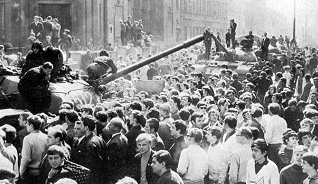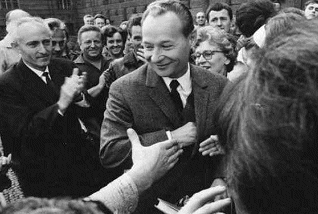Alexander
Dubcek  by
Bill Harry
by
Bill Harry
the
age of 46, he ousted Antonin Novotny and was appointed Czech Party Leader,
the first Slovak to hold the post.
 by
Bill Harry
by
Bill Harry
 |
The
man whose efforts to create “socialism with a human face” in Czechoslovakia
resulted in the ‘Prague Spring’ of 1968. Alexander Dubcek was
born in Ihrovek, Slovakia on 27th November 1921 and his family
emigrated to the Soviet Union when he was four years old, returning
to their homeland in 1938. Alexander became Communist Party secretary
the following year. From August 1944 he was a member of the Slovak Resistance and after the war, in 1949, he became a full-time Communist Party official and was sent to Moscow for political education from 1955-1958. On his return to Czechoslovakia he began to rise in the hierarchy, becoming Leader of the Slovakian Communist Party in 1963 and then in 1968, at |





